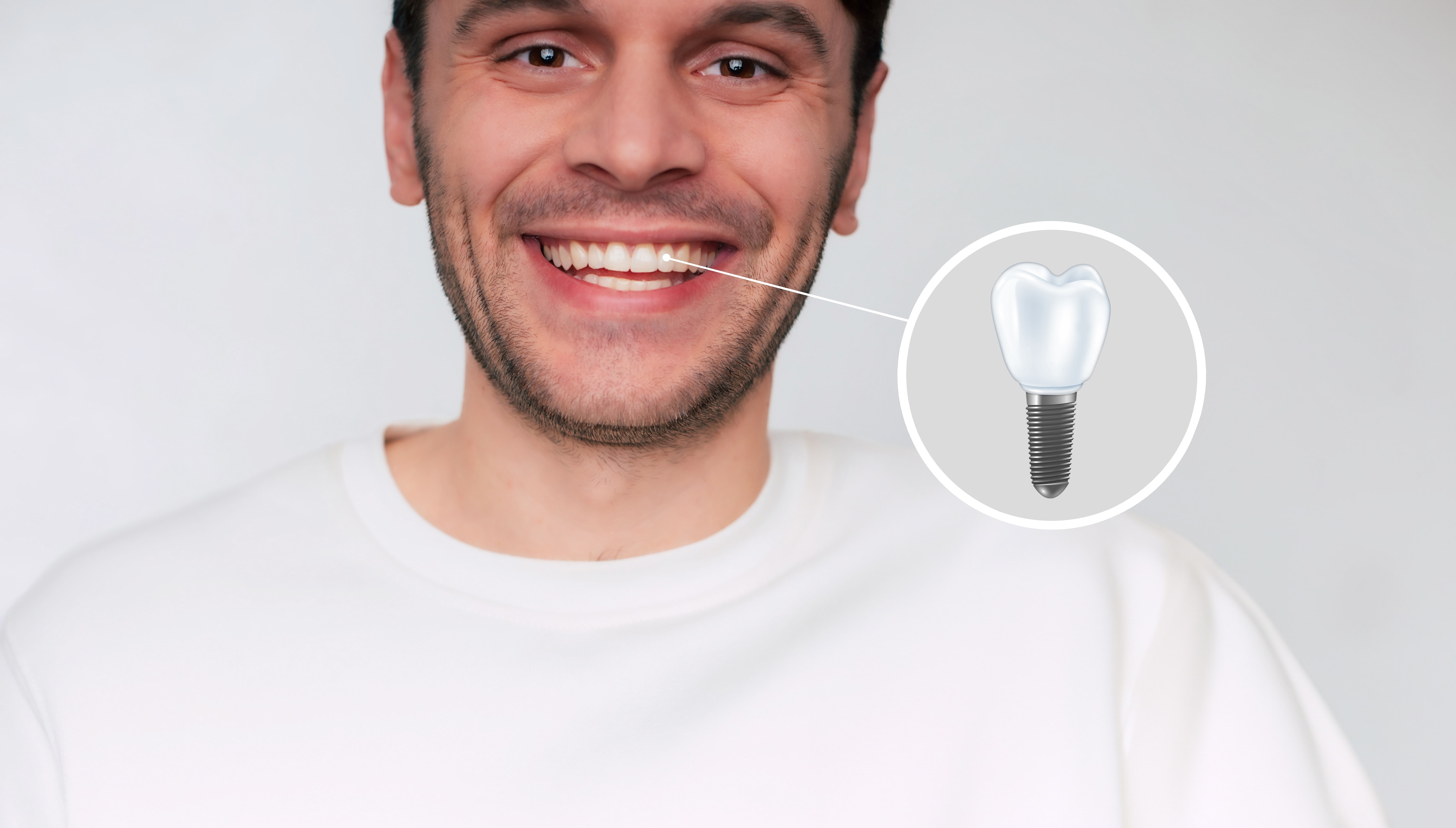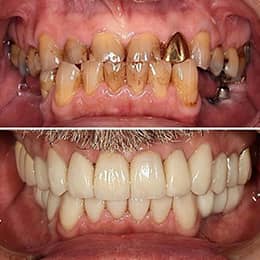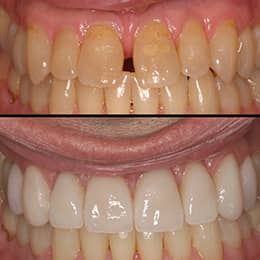Dental Implants
in NYC




If you are over the age of 13, having a missing tooth is no longer considered “cute.” Fortunately, the dentists at New York Smile Institute have a reliable and permanent way to replace missing teeth in adults: dental implants. After undergoing a minor surgery, you will have a prosthetic tooth that looks no different than a natural tooth that is permanently secured to your jaw.
Dental Implants Benefits
The top motivating factor patients cite for getting dental implants is their appearance. Having a space between your teeth detracts from the overall attractiveness of your smile. A prosthetic fills that gap and completes your smile. Because the implant is custom made to match the shade and shape of your natural teeth, the people you interact with will be unlikely to notice the tooth is not real.
That being said, the benefits go well beyond aesthetics. A missing tooth or missing teeth can make eating more challenging. If you have a missing tooth, you are likely to start doing all your chewing on one side of your mouth or adjust the motion of your bite. These changes can cause permanent damage to the jaw, as well as pain. Having an implant allows you to eat food in a normal manner.

Smile with Confidence
As dental professionals it is our priority to provide quality dental care you can trust.
Speaking can also be a challenge when you have missing teeth. You may notice that you developed a slight speech impediment — or even some slurring or whistling — after losing a tooth. Replacing a missing tooth with an implant should correct those problems.
Finally, an implant is critical to maintaining the structure of your other teeth and jaw. Your other teeth may start to drift out of place when there is a hole next to it, so filling in that space with an implant should keep your teeth steady and in proper alignment. Moreover, the jawbone weakens when it does not have all its teeth. Plugging in that space with an artificial tooth will prevent the jaw from eroding and help you avoid developing the dreaded “sunken” look that can add years to a person’s facial appearance.
Dental Implant Procedure Steps
Most patients will receive their dental implants in two separate appointments, spaced a few months apart. At the first appointment, your dentist will give you anesthesia to keep you comfortable as he performs oral surgery. In this surgery, he will make an incision along the gum so he can drill a hole into the jawbone at the point where the tooth is missing. The hole is significant so that the post can reach deep enough to mimic a tooth root. Although this post is not yet ready to hold the permanent artificial tooth, you will receive a temporary tooth to cover the post and fill in the space of the missing tooth in the meantime.
Implant Results
When you return to the dentist’s office a few months later, your dentist will confirm that your mouth has completely healed from the surgery and the post has latched to your jawbone. Once that evaluation is complete, he will use the abutment at the top of the post to attach a screw that will hold the artificial tooth. You will have the opportunity to choose a prosthetic that matches the size, shape and color of your natural teeth so that it blends in perfectly with the rest of your mouth.
Reasons Adult Teeth Fall Out
There are several reasons why you may find yourself without a tooth as an adult. Among the more common reasons our dentists see missing teeth in our patients are:
- Periodontitis: In its most advanced stages, gum disease can cause the gums to recede, which in turn harms the very bones that hold the teeth in place. Without the gum tissue needed to protect these bones, your teeth are more likely to fall out.
- Injury: An accident or traumatic force to the head can cause teeth to fall out in extreme circumstances. Teeth are more commonly damaged to the extent that they cannot be repaired than outright knocked out of the mouth. When this occurs, tooth extraction and subsequent replacement with a dental implant may be appropriate.
- Malnutrition: Your teeth stay healthy with the help of vitamins and minerals in the food you consume. A diet that lacks sufficient vitamin D, vitamin C, calcium and potassium will leave you more susceptible to tooth decay. Naturally, a decaying tooth is more likely to come loose and, if left untreated, later fall out of your mouth.
- Assorted health problems: Patients who have high blood pressure or autoimmune diseases such as type 2 diabetes or rheumatoid arthritis are at an increased risk for losing teeth.
Ultimately, the reason why a tooth fell out is less important than the need to replace it. Dental implants can be used to treat patients who have lost a tooth for any of the reasons. Obviously, if the culprit is gum disease, you should seek periodontal treatment at New York Smile Institute to restore good gum health and better preserve your remaining teeth.
Dental Implants Additions or Alternatives
In some circumstances, your dentist may determine that your jawbone is not strong or thick enough to hold a dental implant. He may recommend first undergoing bone grafting, a procedure which borrows bone from another part of the body and transplants it to the jawbone so that it may better support the implant.
A dental implant is just one of many restorative dental procedures designed to fill in a gap in your mouth. When the dentists at New York Smile Institute examine your mouth, it is possible that they may suggest a procedure other than an implant to better address the situation specific to your mouth. For example, an implant-supported bridge may make more sense if you are missing multiple teeth in a row.
Dental Implant FAQs
How long do dental implants last with proper care?
Dental implants are designed to be a long-term solution for missing teeth. With proper care, they can last 20 years or more — and in many cases, a lifetime. The titanium post that serves as the implant’s foundation fuses with the jawbone, making it extremely durable. However, due to normal wear, the crown or prosthetic tooth attached to the implant may require replacement after 10 or more years. Good oral hygiene, regular dental check-ups, and avoiding harmful habits like teeth grinding or smoking are key to ensuring your implants last as long as possible.
What is the recovery time after dental implant surgery?

Recovery time varies depending on the number of implants placed, your health, and whether additional procedures like bone grafting were performed. Generally, initial healing takes one to two weeks. During this time, you may experience swelling and minor discomfort. However, full osseointegration, the process where the implant fuses with the jawbone, can take three to six months. Once this occurs, the final crown or restoration is placed. You can probably return to normal activities within a couple days of surgery, but full functionality may take several months.
Are dental implants covered by dental insurance?
Dental implant coverage depends on your insurance plan. Some dental insurance policies may cover part of the cost, such as the crown, abutment, or diagnostic imaging, but not the surgical placement of the implant itself. Medical insurance may provide partial coverage if tooth loss was due to an accident or medical condition. During a consultation, our team can provide a quote for the total cost of care, factoring in your level of insurance coverage. Financing is available.
Do dental implants pose any risks?
Dental implant surgery is generally safe, especially when performed by experienced dentists. However, like any surgical procedure, it carries some modest risks like infection, nerve damage, and implant failure due to poor osseointegration. Fortunately, most ccomplications are rare and can be avoided with proper surgical planning, good oral hygiene, and post-operative care.
Can smokers get dental implants successfully?
Smoking can negatively impact dental implant success because it restricts blood flow to the gums and impairs healing. Smokers are more likely to experience implant failure and post-operative infections. However, that doesn’t automatically disqualify someone from receiving implants. By committing to quitting smoking before and after the procedure, you have a better chance of successful outcomes. Discussing smoking habits openly with your dentist is essential for planning a successful treatment.
What are mini dental implants and who is a candidate?
Mini dental implants are smaller in diameter than traditional implants and are often used when patients lack sufficient bone density for standard implants. They are typically used to stabilize dentures or replace small teeth like incisors. Mini implants are less invasive and require shorter healing times, but they may not be suitable for replacing large molars or supporting complex restorations. Candidates with limited bone volume or those seeking a quicker, less costly option may benefit from mini implants.
Should I choose dental implants or dentures for my missing teeth?
Dental implants offer superior stability, functionality, and bone preservation compared to traditional dentures. Unlike dentures, implants do not slip, require adhesives, or contribute to jawbone deterioration. However, dentures are often less expensive upfront and may be a viable short-term solution for patients with limited budgets or health conditions that preclude surgery. The right option depends on your oral health, preferences, and financial situation. A consultation can help determine the best treatment for your specific needs.
Schedule a Consultation
To restore your smile with dental implants, look no further than the respected team of doctors at New York Smile Institute Our dentists are experienced at performing safe and effective oral surgery. To arrange a consultation, please call (212) 319-6363 at your soonest convenience.

Photo
Gallery
The Aesthetic and Reconstructive Team at New York Smile Institute is here to help. Check out some of our work by visiting our Smile Gallery below.




The Dr. Dean Experience
Dentist of the Dentists
Dr. Dean Vafiadis is the Founder of New York Smile Institute and a respected Prosthodontic specialist in New York and around the world. He also serves as an Associate Professor of Prosthodontics at NYU College of Dentistry and routinely lectures around the world on dentistry. His mission is to serve his patients’ dental needs while also helping to advance dental care treatments and therapeutics on an industry level.





Contact Us

693 Fifth Avenue
@54th Street – 14 Floor
New York, NY 10022